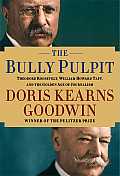 Ah, Doris, where have you gone? Doris Kearns Goodwin, that is. The brilliant author of Team of Rivals has produced in The Bully Pulpit as far from the quality of the Lincoln work as New York from North Dakota. Or Cuba. North Dakota is, of course, where Teddy Roosevelt spend a period of time as a cattle rancher in between political gigs and a military stint with the celebrated Rough Riders in Cuba during the Spanish American War,
Ah, Doris, where have you gone? Doris Kearns Goodwin, that is. The brilliant author of Team of Rivals has produced in The Bully Pulpit as far from the quality of the Lincoln work as New York from North Dakota. Or Cuba. North Dakota is, of course, where Teddy Roosevelt spend a period of time as a cattle rancher in between political gigs and a military stint with the celebrated Rough Riders in Cuba during the Spanish American War,

Goodwin meticulously traces his lineage and his rise to political rock-stardom and parallels it with that of his friend and vice-president, William Howard Taft. She also includes the story of McClure’s magazine and its staff in the narrative. Bundled together, she means to represent the exciting movement of the country from laissez-faire capitalism which laid not a glove on any monopoly or monopolizer worthy of the name, to trust-busting progressivism which favored labor and women’s suffrage and a number of other transforming notions which changed the shape of the country. TR was an ultimate phrasemaker (Think softly, big stick), and his The Bully Pulpit derives from his conviction that he could pass laws and change minds via his speechmaking platform as president whenever congress resisted the will of the people. McClure’s along with other journalists, became his partners in the progressive enterprise. Taft, on the other hand, serves as a foil for Teddy. He was basically a judge with a legal mind dedicated to process and practicality. He believed in many of the same ideas as his friend (though their friendship was virtually destroyed when TR started a third party and opposed him in the 1912 election) but he disliked public speaking and crowds. He was a warm and likable man, but not a manipulative, podium pounding politician. If anything, he was the anti-bully pulpit.
Exciting as the transformation was, Goodwin manages to drain the juice out of it and provide little new insight along the way.Maybe the McClure’s stuff counts as interesting, but she over and again stalls her narrative with pages and pages of quotes from letters, speeches, articles, newspaper verbiage. Why quote one passage when ten will do? Why five hundred pages when you can write seven hundred and fifty? I so looked forward to reading this when I saw the cover and the author, but I’ve seldom been more happy to finish a book.
Maybe the real Doris will reappear soon.
